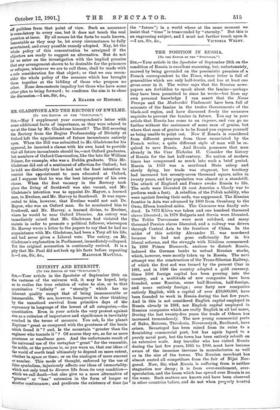INFINITY AND ETERNITY.
[TO THE EDITOR OF THE "SPECTATOR."] Sm,—Your article in the Spectator of September 28th on the vastness of the universe will, it may be hoped, help us to realise the true relation of value to size, or to that quantitative " infinity " or " eternity " which has no inherent quality ' except that of being immeasurable or innumerable. We are, however, hampered in clear thinking by the unnoticed survival from primitive days of the supremacy in language of the lowest of all categories,—the quantitative. Even in your article the very protest against size as a criterion of importance and significance is inevitably couched in the terms of measure. You ask, Is the planet Neptune " great as compared with the greatness of the brain which found it " P and, Is the mountain " greater than the engineer who tunnels it " P Of course they are, as far as mere greatness or smallness goes. And the unfortunate result of the universal use of the metaphor ",great" for the venerable, the noble, or the precious is, as you warn us, that our ideas of the world of worth tend ultimately to depend on mere extent, whether in space or time; or on the analogue of mere amount or number. This mode of thought, enforced by the use of false symbolism, injuriously affects our ideas of immortality, which not only tend to divorce life from its very condition— which we call death—but also give us a mere alternative of "greater" or " less " extension in the form of longer or shorter continuance; and predicate the existence of time (as
the " future ") in a world where at the same moment we insist that " time " is transcended by "eternity." But this is an engrossing subject, and I must not further touch upon it.














































 Previous page
Previous page